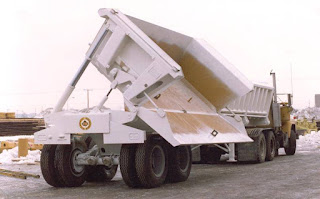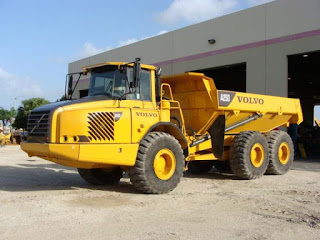Cranepedia - Dump Truck is the most common means of transport used in the open pit. Dump truck designed specifically for mine road conditions (not asphalt). First dump truck tahuhn created and introduced in 1930 with a capacity of approximately 15 tons. In the 1950s, its capacity increased to approximately 30 tonnes and increased again to approximately 350 tonnes in 1970.
Conveyance is used to transport the soil, sediment, ore, rock for buildings, and others. Speed and high production and is flexible, meaning that it can be used to transport a variety of materials that have shape and number of diverse as well and not overly dependent on the lane.
Dump truck can be classified based on several things, among others:
1. Based on the kind of the driving wheel (wheel drive), which are:
- Front wheel drive: The wheels are driving the front wheels. In general, slower and premature wear on the front wheels.
- Rear wheel drive: The wheels are driving the rear wheels. Truck type most widely used at present because of the lower front wheel wear.
- Four wheel drive (4WD): The wheels are driving wheels front and rear, so that a greater impetus. Therefore, this type banya truck used in pathways muddy roads and mushy.
- Double rear wheel drive: the driving wheels are all the rear wheels. In general, this type of drive wheels used for trucks large capacity and is used to track the low carrying capacity.
2. By way of unloading there are three kinds, which are:
The election of the size of the truck is a bit difficult, but as grip (rule of thumb) can be said that the minimum capacity of the truck is approximately 4-5 times the capacity dig tool (power showel or dragline).
The hourly product of a dump truck working in the same job simultaneously can be calculated with the following formula:
Description:
P = Product per hour (m3 / hr)
C = Product per cycle
Et = The efficiency of dump truck
Cmt = dump truck cycle time (minutes)
M = Number of dump truck working
n = number of cycles of a loader to fill dump trucks
q1 = bucket capacity (m3, cuyd)
K = Factor bucket loader
Es = Efficiency loader work
Cms = loader cycle times (minutes)
The hourly product of a dump truck working in the same job simultaneously can be calculated with the following formula:
C = n x q1 x K
P = (C x 60 x Et / Cmt) x M
Description:
P = Product per hour (m3 / hr)
C = Product per cycle
Et = The efficiency of dump truck
Cmt = dump truck cycle time (minutes)
M = Number of dump truck working
n = number of cycles of a loader to fill dump trucks
q1 = bucket capacity (m3, cuyd)
K = Factor bucket loader
Es = Efficiency loader work
Cms = loader cycle times (minutes)
3. Based on the size of the cargo, dump trucks can be divided into three, which are:
Dump truck small size (maximum capacity of 25 tons)
Dump truck-sized (25 to 100 ton capacity)
Dump truck large size (capacity of more than 100 tons)







It was thinking about whether I could utilize this review on my other site, I will connect it back to your site though.Great Thanks.nemzetközi szállítmányozás europa-road.eu
ReplyDeleteNice to read your article! I am looking forward to sharing your adventures and experiences. quarried aggregates
ReplyDeleteThanks for the blog loaded with so many information. Stopping by your blog helped me to get what I was looking for. mustang exterior
ReplyDeleteHey, this day is too much good for me, since this time I am reading this enormous informative article here at my home. Thanks a lot for massive hard work. BULGERS
ReplyDeleteToday, I was just browsing along and came upon your blog. Just wanted to say good blog and this article helped me a lot, due to which I have found exactly I was looking. PACKYNGYU .
ReplyDeletemodular and semi-modular equipment, low-loaders and dollys that can be configured to move almost anything anywhere. https://europa-road.eu/hu/fuvarozas.php
ReplyDeletePost a Comment